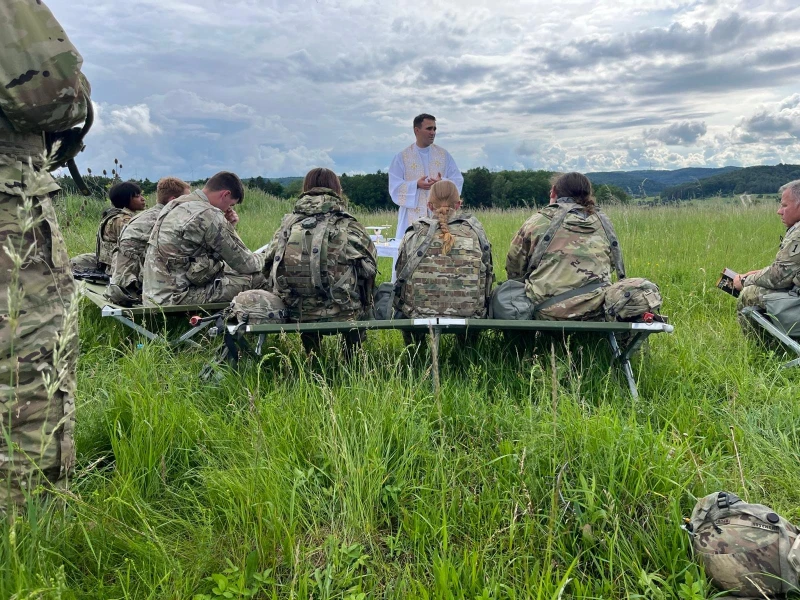

Father Adam Muda, a chaplain for the U.S. Army, celebrates Mass on the field with soldiers while in Germany. / Credit: Photo courtesy of Father Adam Muda
CNA Staff, Oct 23, 2025 / 07:00 am (CNA).
During Pastoral Care Week, celebrated Oct. 19–25, a Catholic psychotherapist encouraged a group of Catholic chaplains and ministers to pursue prayer, rest, and self-care in light of burnout — a challenge that often accompanies their unique work.
At an Oct. 22 webinar, “Carrying the Cross Without Burnout: Self-Care for Catholic Chaplains,” Adrienne Koller, a Catholic psychotherapist and founder of Strong Self Psychotherapy, encouraged chaplains to make time for spiritual and emotional renewal.
The webinar, organized by the National Association of Catholic Chaplains (NACC), a group that educates and supports Catholic chaplains across the country, highlighted the importance of finding rest amid the emotional toll of ministry.
“God doesn’t call us to self-erasure,” Koller told the nearly 100 chaplains who attended the webinar. “He calls us to stewardship of our bodies, our minds, and spirits.”

Koller described self-care as “stewardship” and “caring for the vessel God entrusted to you.”
“One of the most powerful mindset shifts I’ve seen in ministry is this: Self-care is not selfishness; it’s stewardship,” Koller said. “You are the vessel God entrusted with the work he gave you, and taking care of that vessel honors him.”
“You’re not taking away from your calling. You’re strengthening it,” she said. “Renewal isn’t an indulgence — it’s obedience.”
Erica Cohen Moore, executive director of NACC, highlighted the importance of caring for chaplains, both during Pastoral Care Week and throughout the year.
“Our chaplains are often called into spaces where few others are willing or able to go,” Cohen Moore told CNA. “They serve people in some of the most marginalized and challenging situations, where grief and suffering can be profound.”
Pastoral Care Week “gives opportunities for organizations and institutions of all types to recognize the spiritual caregivers in their midst and the ministry that the caregivers provide,” according to the NACC’s website.
Chaplains are often priests, but seminarians, deacons, religious brothers and sisters, and laymen and laywomen can all serve as chaplains, providing professional spiritual and emotional support in a range of areas — often in prisons, hospitals, fire departments, and campuses.
To help prepare and support chaplains, the NACC offers a variety of resources, training, community, and support for chaplains, both Catholic and non-Catholic.
What does burnout look like?
“Over the years, I’ve walked with countless individuals who appear incredibly strong on the outside yet wrestle with exhaustion, doubt, or the feeling that their work has taken more from them than they have time to replenish,” Koller told attendees.
Koller noted that the “emotional weight” of service can lead to burnout.
“That emotional weight, it doesn’t mean you’re doing something wrong; it means you’re human,” she said. “But we do take on that emotional weight, and that can lead, if unchecked, to burnout.”
“Burnout doesn’t happen because we’re weak or we’re incapable,” Koller continued. “It happens because we care deeply, we give fully, and sometimes we forget to refill our own cup.”
To combat the weight of service, Koller encouraged ministers to pray before and after each difficult meeting or encounter, and to offer the weight of those challenges to the Lord. She also led the group in grounding prayer exercises that incorporate breathing into prayer.

Cohen Moore noted that burnout is a “very real concern” that chaplains face — one that her organization works to combat through the resources they provide.
The association educates chaplains with a program called Clinical Pastoral Education (CPE), which is “a process that equips them to manage burnout and care for themselves and one another,” according to Cohen Moore.
The group also offers webinars on topics such as self-care, mental illness and trauma, and mental health, as well as networking groups and in-person gatherings, and publishes a magazine called Works of Hope.
The association plans to launch a learning institute early next year to include a course on “sustaining pastoral ministers and helping them avoid burnout,” Cohen Moore said.
“Burnout is a very real concern in our field, and we take it seriously as we continue exploring new ways to provide care and connection,” Cohen Moore said.
‘I will give you rest’
When Koller speaks with “those in service, especially chaplains and first responders,” she said that one verse “always comes to mind.”
In Matthew 11:28, Jesus says: “Come to me, all you who labor and are burdened, and I will give you rest.”
Koller noted that Christ “doesn’t say: ‘Keep pushing, work harder, work harder, deplete yourself, run yourself into the ground.”
“No — he says, ‘Come to me,’” she said.
“That invitation isn’t to perform,” Koller continued. “It’s to rest, in a way, to surrender the illusion that we have to carry everything alone. That’s where our renewal begins.”
Read More
